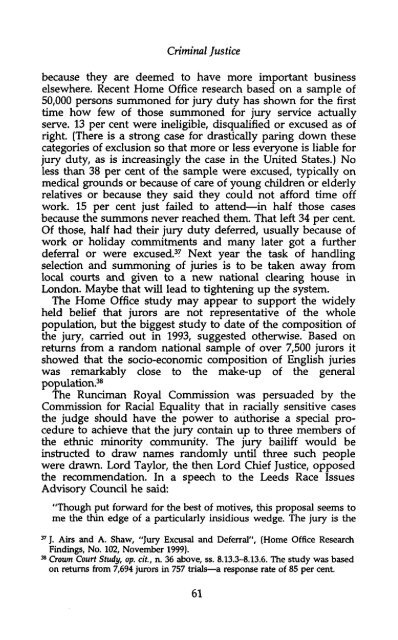HAMLYN - College of Social Sciences and International Studies ...
HAMLYN - College of Social Sciences and International Studies ...
HAMLYN - College of Social Sciences and International Studies ...
Create successful ePaper yourself
Turn your PDF publications into a flip-book with our unique Google optimized e-Paper software.
Criminal Justice<br />
because they are deemed to have more important business<br />
elsewhere. Recent Home Office research based on a sample <strong>of</strong><br />
50,000 persons summoned for jury duty has shown for the first<br />
time how few <strong>of</strong> those summoned for jury service actually<br />
serve. 13 per cent were ineligible, disqualified or excused as <strong>of</strong><br />
right. (There is a strong case for drastically paring down these<br />
categories <strong>of</strong> exclusion so that more or less everyone is liable for<br />
jury duty, as is increasingly the case in the United States.) No<br />
less than 38 per cent <strong>of</strong> the sample were excused, typically on<br />
medical grounds or because <strong>of</strong> care <strong>of</strong> young children or elderly<br />
relatives or because they said they could not afford time <strong>of</strong>f<br />
work. 15 per cent just failed to attend—in half those cases<br />
because the summons never reached them. That left 34 per cent.<br />
Of those, half had their jury duty deferred, usually because <strong>of</strong><br />
work or holiday commitments <strong>and</strong> many later got a further<br />
deferral or were excused. 3 ? Next year the task <strong>of</strong> h<strong>and</strong>ling<br />
selection <strong>and</strong> summoning <strong>of</strong> juries is to be taken away from<br />
local courts <strong>and</strong> given to a new national clearing house in<br />
London. Maybe that will lead to tightening up the system.<br />
The Home Office study may appear to support the widely<br />
held belief that jurors are not representative <strong>of</strong> the whole<br />
population, but the biggest study to date <strong>of</strong> the composition <strong>of</strong><br />
the jury, carried out in 1993, suggested otherwise. Based on<br />
returns from a r<strong>and</strong>om national sample <strong>of</strong> over 7,500 jurors it<br />
showed that the socio-economic composition <strong>of</strong> English juries<br />
was remarkably close to the make-up <strong>of</strong> the general<br />
population. 38<br />
The Runciman Royal Commission was persuaded by the<br />
Commission for Racial Equality that in racially sensitive cases<br />
the judge should have the power to authorise a special procedure<br />
to achieve that the jury contain up to three members <strong>of</strong><br />
the ethnic minority community. The jury bailiff would be<br />
instructed to draw names r<strong>and</strong>omly until three such people<br />
were drawn. Lord Taylor, the then Lord Chief Justice, opposed<br />
the recommendation. In a speech to the Leeds Race Issues<br />
Advisory Council he said:<br />
"Though put forward for the best <strong>of</strong> motives, this proposal seems to<br />
me the thin edge <strong>of</strong> a particularly insidious wedge. The jury is the<br />
37 J. Airs <strong>and</strong> A. Shaw, "Jury Excusal <strong>and</strong> Deferral", (Home Office Research<br />
Findings, No. 102, November 1999).<br />
38 Crown Court Study, op. cit., n. 36 above, ss. 8.13.3-8.13.6. The study was based<br />
on returns from 7,694 jurors in 757 trials—a response rate <strong>of</strong> 85 per cent.<br />
61

















